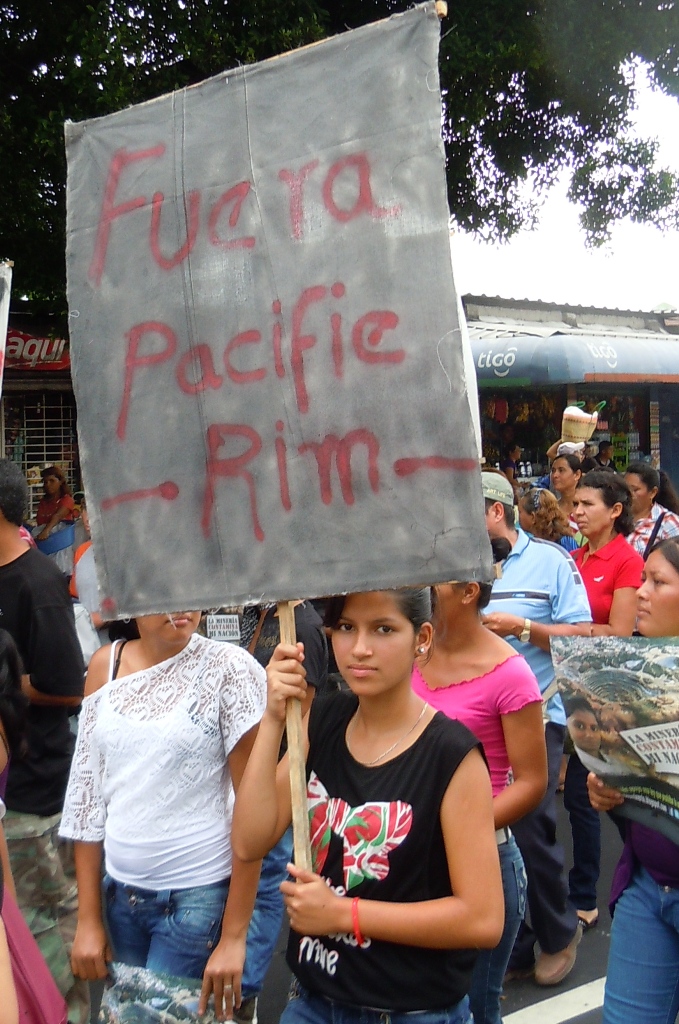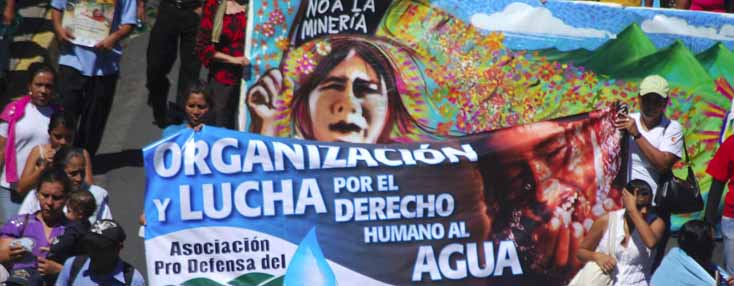On October 08, 2013, Australian based OceanaGold Corporation; announced that it would be acquiring Canadian based Pacific Rim Mining. Pacific Rim’s main asset is the controversial El Dorado project in the northern department of Cabanas, El Salvador. This announcement has raised concerns amongst civil society organizations in El Salvador and abroad due to the controversy surrounding the El Dorado mining project. Since 2009 seven people have died as a direct result of conflicts caused by the presence of Pacific Rim Mining in the region.
Since the early 2000 as many as 10 transnational mining corporations are seeking to extract gold and other precious minerals buried under the northern mountains which provide the main source of clean water, fresh air and local agricultural production for the country.
 Mining corporations have lobbied the government of El Salvador to introduce a legal and logistical framework to set up industrial scale open pit mines through the northern region. However their efforts have met highly organized opposition from communities, civil society and church organizations that have repeatedly raised concerns over the use of excessive amounts of water, environmental degradation, public health impacts, as well as the social division that these projects may cause in a densely populated country with one of the highest levels of vulnerability to natural disasters in the world.
Mining corporations have lobbied the government of El Salvador to introduce a legal and logistical framework to set up industrial scale open pit mines through the northern region. However their efforts have met highly organized opposition from communities, civil society and church organizations that have repeatedly raised concerns over the use of excessive amounts of water, environmental degradation, public health impacts, as well as the social division that these projects may cause in a densely populated country with one of the highest levels of vulnerability to natural disasters in the world.
In 2009, the Salvadoran government acceded to public pressure and stopped issuing mining exploration and exploitation permits pending an environmental impact assessment. As a result two mining corporations, one based in Wisconsin, US, and one based in British Columbia, Canada, are suing the government for over $400 million under the International Centre for the Settlement of Investment Disputes, ICSID, an international trade tribunal housed by the World Bank. These law suits, allowed under “investor - state” clauses contained in free trade agreements such as DR-CAFTA, are not only a drain on the government’s limited resources, but also threaten the democratically elected government of El Salvador’s right to make policy decisions based on public interest.
The campaign in defense of a clean and a healthy environment has been led by a highly organized movement of civil society organizations convened under the National Roundtable Against Metal Mining, La Mesa, which has successfully prevented the installation of large scale mining projects in the country. Their fight, however, has come at a great cost; the presence of mining corporations in El Salvador has led to localized conflicts and violations of human rights in communities where mining operations are located. The community of San Sebastian, where US Corporation Commerce Group has its operations, is currently enduring the long term health impacts of acid drainage leaching from a mine abandoned since 2006. For the communities living along Lake Guija, in the border department of Metapan, the threat of contamination comes from a mine, owned by Canadian corporation Goldcorp, located in the neighboring country of Guatemala; this mine threatens to contaminate the Lempa River, the main source of domestic water for 60% of the population of El Salvador.

Canada based Pacific Rim Mining Corporation has been the most controversial of the companies suing El Salvador, its El Dorado mining project in the department of Cabanas has been denied an exploitation permit since 2006. As a result, the company is suing the government of El Salvador for $315 million under the International Centre for Settlement of Investment Disputes, ICSID, a corporate tribunal housed at the World Bank.
At the same time, the Pacific Rim has maintained an active campaign to influence international aid institutions to pressure the government of El Salvador to approve its project and it continues to conduct activities that will sow conflict in the communities and discredits local environmentalists who oppose their mining project. At least seven members of the community have been murdered as a direct result of these conflicts; these include four well known anti-mining leaders, including a woman 8 months pregnant. In the meantime death threats, intimidation and violent attacks continue to be a common occurrence among high profile community leaders who oppose the mine.
OceanaGold first got involved with Rim in September 2012 when it made a preliminary cash placement of $4.2 million into Pacific Rim in exchange for 20% of its total stock. Pacific Rim announced that such investment would finance its continued legal dispute with the government of El Salvador. Since then members of La Mesa and their international allies have been concerned about OceanaGold`s takeover of Pacific Rim
